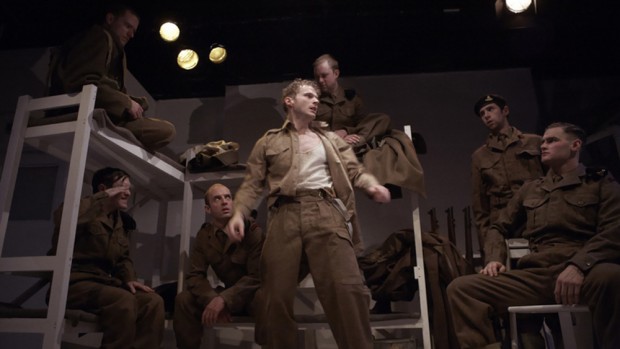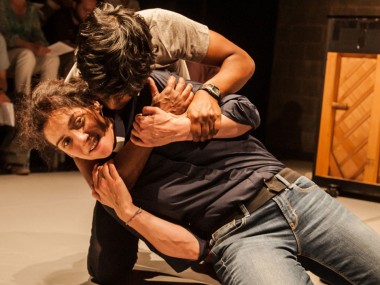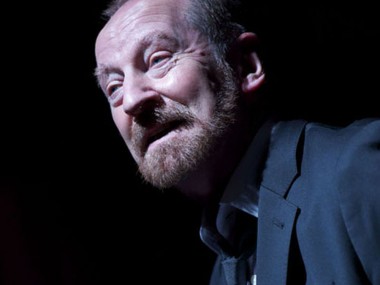Events While Guarding the Bofors Gun, Finborough Theatre
Wednesday 6th June 2012

This week’s theme is masculinities. They say that blokes will be blokes, and that they never quite manage to leave the school playground, but is this really true? And what happens when war or death tests men — and asks what are they really made of? One 20th-century classic, John McGrath’s Events While Guarding the Bofors Gun addresses these issues. First staged in 1966, the play is set during the era of National Service, as a group of men are ordered to guard a Bofors gun in the British Zone of Germany in 1954. The joke is that the weapon is obsolete and that the six gunners will do anything to wind up their inexperienced commander, the 18-year-old Lance-Bombadier Evans.
Evans is in charge of a mixed crew of regular squaddies and National Service recruits: a group of Cockneys, northerners and a Northern Irishman. Most striking is Gunner O’Rourke, a wild Irishman with a taste for insubordination, alcohol and death. By contrast, Evans is a nice middle-class boy who wants to be liked, but whose tolerant exterior hides a desperate ambition to be promoted to the officer class. But the unpredictability of his men’s behaviour means that his will is severely tested. So although the main theme of the play is the grim futility of guarding an out-of-date Bofors gun, McGrath also explores various kinds of masculinity. Cooped up together, these boys brag about their sexual prowess, accuse each other of being gay and compete blindly on any subject at issue. Most want to get drunk.
But the real testosterone madness is reserved for O’Rourke, who is not just a rebel, but actually something much more irreconcilable. He’s a symbol of youthful nihilism, a Johnny Rotten of his time. Not for the last time, the conflict between men is represented as that between good men, who are weak, and bad boys, who are self-destructive, but charismatic. He also symbolises the destructiveness of war. Yep, that’s O’Rourke — he’s the one you watch.
As a picture of the British nation, this is one that buzzes with conflict. The Irish question is raised and class conflict is acutely shown. Powerfully directed by Robert Hastie, this revival has strong performances from a cast led by Charles Aitken as O’Rourke and Lee Armstrong as Evans, with good support from the rest. It all makes for a thrilling evening in this fringe theatre, which is commemorating ten years since McGrath’s death in 2002. And you can see why this exceptional theatre-maker is still a theatre legend.
© Aleks Sierz



